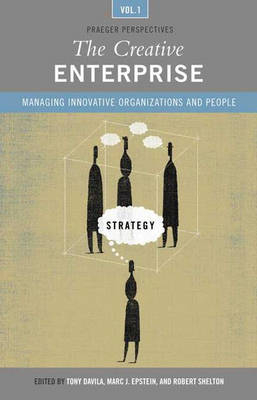
The Creative Enterprise
Praeger Publishers Inc
978-0-275-98685-8 (ISBN)
- Titel z.Zt. nicht lieferbar
- Versandkostenfrei
- Auch auf Rechnung
- Artikel merken
Create—to make or bring into existence something new, derived from the Latin crescere, to grow. Creativity is the lifeblood of any business—from fledgling startup to global giant, creativity is what inspires entrepreneurs to take the leap into the unknown, motivates project teams to design faster and better products, drives executives to set their sights on new markets and customers. Where does this creativity come from? How can it be channeled into profitable ventures? The Creative Enterprise brings together the most current thinking from academics and practitioners around the world to shed new light on creativity and how it drives business growth. It addresses such topics as: Why are some organizations creative and others are not? What catalyzes new ideas? How can leaders balance short-term financial pressures and long-term creative aspirations? And how can firms maximize the value of their ideas into profitable products and services?
While many authors have tackled pieces of the puzzle, this set uniquely integrates insights from the fields of management, economics, technology, psychology, and sociology, to cover the spectrum across individual and organizational innovation. Volume 1 focuses on innovation strategies, with chapters on developing the new product pipeline, measuring the impact of innovation on firm growth, technology transfer, and strategic alliances. Volume 2 considers the individual and organizational aspects of innovation, with chapters on creativity and artwork, idea catalysts and blocks, and the interplay between organizational culture and innovation. Volume 3 covers the infrastructure for promoting and sustaining innovation, with chapters on managing creative teams, selecting and funding projects, and developing effective performance measurement and rewards systems.
TONY DAVILA is a faculty member at IESE Business School, University of Navarra, and in the Graduate School of Business at Stanford University, where he specializes in performance measurement and control systems for innovation management. He consults to large companies and Silicon Valley startups, and has published in leading journals, including Research Policy and the Harvard Business Review. With Marc J. Epstein and Robert Shelton, he is co-author of Making Innovation Work. MARC J. EPSTEIN is Distinguished Research Professor of Management, Jones Graduate School of Management, Rice University and was recently Visiting Professor and Hansjoerg Wyss Visiting Scholar in Social Enterprise at the Harvard Business School. A specialist in corporate strategy, governance, performance management, and corporate social responsibility, he is the author or co-author of over 100 academic and professional papers and more than a dozen books, including Counting What Counts, Measuring Corporate Environmental Performance, Making Innovation Work (with Tony Davila and Robert Shelton), and Implementing E-Commerce Strategies (Praeger, 2004), and co-editor and contributor to the multi-volume set, The Accountable Corporation (Praeger, 2005). A senior consultant to leading organizations and governments for over 25 years, he currently serves as Editor-in-Chief of the journal Advances in Management Accounting. ROBERT SHELTON is Principal at PRTM Management Consultants. He advises executives in a wide variety of industries and speaks on issues of innovation and business strategy to corporate, government, and university audiences around the world. Previously serving as Managing Director at Navigant Consulting, Vice President and Managing Director with Arthur D. Little, and as Managing Director of the Technology Management Practice at SRI International, his work has been cited in such publications as the Wall Street Journal and CNN Financial News and been broadcast on National Public Radio. With Marc J. Epstein and Antonio Davila, he is co-author of Making Innovation Work.
Introduction
Chapter 1: Why Innovate? The Impact of Innovation on Firm Performance
Chapter 2: A Strategic Framework for Innovation Management
Chapter 3: Incremental Innovation or Radical Innovation? True Relevance, Ownability and Impact
Chapter 4: Toward a Non-linear History of R&D: Examples from American Industry, 1870-1970
Chapter 5: Silicon Valleys Next Act: Creativity, Consumers, and Cross-Disciplinary Innovation Move Toward Center Stage
Chapter 6: The Pipeline from University Laboratory to New Commercial Product: An Organizational Framework Regarding Technology Commercialization in Multidisciplinary Research Centers
Chapter 7: Bringing University Technology to the Private Sector
Chapter 8: Social Innovation
Chapter 9: Introducing Radically New Products and Services
Chapter 10: Turning Creativity into Value Creation: The Growth Path of Startup Firms
Chapter 11: The Promise of Management Control Systems for Innovation and Strategic Change
Index
About the Editors and Contributors
Introduction
Chapter 1: Dialectics of Creativity in Complex Organizations
Chapter 2: Leading for Creativity: An Employee-Manager Dyadic Approach
Chapter 3: 3-D Creativity in Organizations: Discipline, Discipline, Discipline
Chapter 4: Overcoming Creative Blocks
Chapter 5: The Psychology of Creativity
Chapter 6: Creativity, Cognition and Cyborgs: The Extended Mind Hypothesis as an Explanatory Framework for Creativity Research
Chapter 7: The Role of Effective Organizational Culture in Fostering Innovation and Entrepreneurship
Chapter 8: The Social Context of Innovation
Chapter 9: Creative Cognition in the Workplace: An Applied Perspective
Chapter 10: Designing Rewards to Enhance Innovation
Index
About the Editors and Contributors
Introduction
Chapter 1: The Case of Honda Accord Wagon Development: A Knowledge Creation Perspective
Chapter 2: Funding Innovation Through Venture Capital: A Global Perspective
Chapter 3: Drivers and Measures of Innovation Success
Chapter 4: Moving from Creation to Value
Chapter 5: Variations on a Theme: The Reinvention and Renewal of Intellectual Property
Chapter 6: Organizational Design for Corporate Creativity in the Indian Setting
Chapter 7: Managing Global Innovation Projects
Chapter 8: Cash Constraints and Venture Capital Stage Investing in Startup Companies
Chapter 9: Sector-Focused Incubation: A Tool for Promoting Technology Innovation and Commercialization
Chapter 10: Measuring Innovation: A Framework for Action
Chapter 11: Management of Innovation and Product Development Processes
Index
About the Editors and Contributors
| Erscheint lt. Verlag | 30.12.2006 |
|---|---|
| Sprache | englisch |
| Gewicht | 1899 g |
| Themenwelt | Wirtschaft ► Betriebswirtschaft / Management ► Personalwesen |
| Wirtschaft ► Betriebswirtschaft / Management ► Unternehmensführung / Management | |
| ISBN-10 | 0-275-98685-3 / 0275986853 |
| ISBN-13 | 978-0-275-98685-8 / 9780275986858 |
| Zustand | Neuware |
| Haben Sie eine Frage zum Produkt? |
aus dem Bereich


